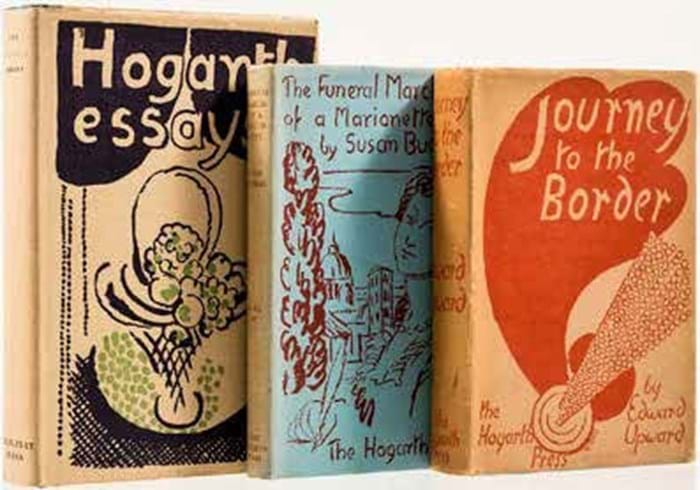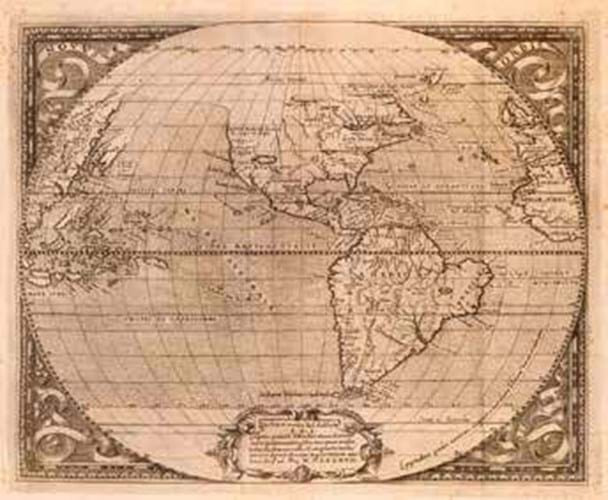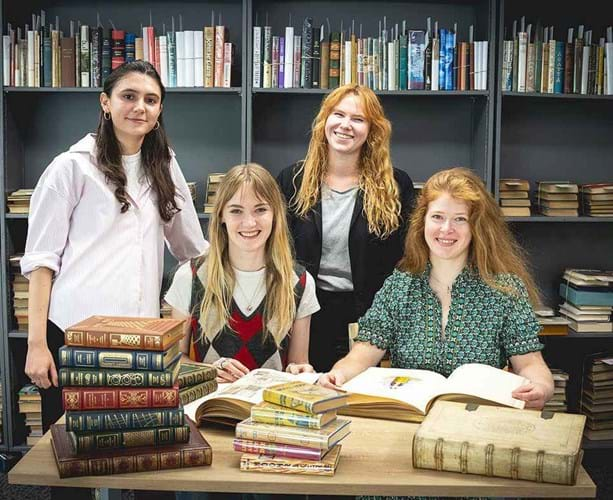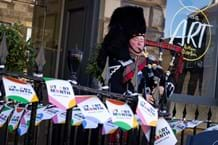“Because there are a lot of old, white men it’s very nice we have a small group of women looking after each other in this male-dominated industry”, says Hester Malin, book specialist in modern literature at Forum Auctions.
She is referring to herself and three colleagues – Ella Wooldridge, Lydia Gardner and Cosima Benson- Colpi – who work together in the south London auction house’s books and manuscripts department.
ATG is speaking to the four women about their fledgling careers, change in the antiquarian book trade and their advice for others considering following in their footsteps.
Improving trend
An article on the website of the International League of Antiquarian Booksellers (ILAB) stated that “not more than 10% of around 2000 ILAB affiliates” in 2015 were women. The ILAB did not have more recent statistics to share, but Benson- Colpi says there are now “quite a lot of women” working in the industry in London.
Wooldridge adds that while there is the “old guard”, different people are coming into the trade. “The fact that we [four] are here shows that it is changing a bit”, says Gardner.
Malin has experienced sexism in the industry “be it blatant or otherwise”, particularly in her younger years, but says her employers look after their staff and stand up for them when needed. She is part of an informal book group with women from across the rare book trade who “have each other’s backs”.
There “is still such a long way to go” on diversity, says Wooldridge. “I’m still shocked by how much not so much misogynistic but racially charged stuff is acceptable in the market”, she says. “It’s old anthropological texts and terrible things. Why are people still interested in this?”
Malin says the auction house tries “not to sell those things as much as we can” and that she always looks to feature female writers, and authors from “every kind of background”, as much as possible.
She has been discussing with her colleague Max Hasler, a fellow modern literature specialist, about curating a sale of works by only female, or only LGBTQ, authors. “It’s about putting those [books] to the front and people will absolutely get excited for them”, says Malin, 27.
The day before we meet last month Malin’s 400-lot online modern literature sale achieved a hammer total of £110,100, exceeding the presale high estimate.
Material related to the Bloomsbury group, which Malin says is a “very hot topic”, performed well including a group of three works with dust jackets designed by Vanessa Bell, which sold for £950 against an estimate of £300-400. Crime detective fiction remains “as strong as ever”.

Group of three works with dust jackets designed by Vanessa Bell, which sold for £950 in Forum’s Modern Literature sale on August 24.
Malin has been with the auction house for four years and fell into this line of work “completely accidentally” after completing her undergraduate English degree.
Book specialist Dido Arthur invited her in for a day. “I thought that it was a publishing house… [so] I was a bit shocked but I absolutely loved it”, says Malin. “A day turned into a week, which turned into an internship, which turned into a job.”
Her career is the “flip side” of her academic interests. “Studying English literature you’re looking at the text itself and what we do is almost the opposite; it’s looking at the book as relic”, she says.
“Even though it was completely different it still gave such a different insight into authors and what they do. I especially love doing any letters or inscribed things where it reveals a little bit more personal history about the author.”
The career’s appeal for trainee cataloguer Wooldridge, 25, who joined as an intern in January and now handles a lot of the condition reports, was the research possibilities.
After finishing her masters degree in medieval history, she decided not to pursue further academic study. “My logic at the time was I don’t want to learn more about less, I want to learn more about more, and working in the antiquarian book trade you do that”, she says.
“You can have a first edition of James Bond on your desk and then some old seal… It keeps on giving in terms of interest.”
Collectors vary
A lot of the tradespeople who buy from Forum Auctions are “carbon copies of each other in a really sweet way, all wearing jumpers and the same glasses”, says Wooldridge, but there is greater variety among the collectors with whom she deals.
Malin agrees there is not a typical collector. “They can be an old rag and bone man who very much goes to all the fairs and is after a certain gem, or they can be what people imagine them to be – an aristocratic-type person who fills their library”, she says.
“What I love about this industry, and what is surprising, is that people can have just as much passion and enthusiasm and it doesn’t matter how much money they have or what book they’re buying. If it’s filling that last spot of an Ian Fleming collection and they’ve spent hundreds of thousands of pounds, or they found a really niche piece of ephemera for £30 at a book fair, it has the same passion behind it.”
A favourite part of her job is visiting clients’ homes and seeing the libraries these fellow book enthusiasts have created. “They’re always absolutely mad, but absolutely loveable”, says Malin, 27, who has the beginnings of a collection by her favourite author, the 20th-century English writer Dorothy Whipple.
She says those outside the industry do not realise it is a social career; as well as meeting clients, the 11-person books department works as a team.
“People imagine us in a dusty old room with no lighting and we’re just looking at books”, says Malin, who points out that auction houses work to much tighter deadlines than bookshops so anyone choosing this career path needs to thrive under pressure. “While that is true to an extent, it’s very sociable.”
It was the balance of “interacting with others [and] interacting with interesting objects” that attracted Gardner, 25, to the antiquarian book trade.
She has a masters degree in history of art, specialising in the medieval period, and has been with Forum Auctions since completing an internship in 2021. She spotted the rare engraved folding Hakluyt-Martyr map of the New World within the 16th-century book by Peter Martyr d’Anghiera that fetched £130,000 in January.

The engraved folding Hakluyt-Martyr map of the New World within the 16th-century book by Peter Martyr d’Anghiera that fetched £130,000 at Forum Auctions on January 26.
History insight
Gardner, who appreciates the creativity that comes with cataloguing items, the main part of her role, is particularly interested in 17th century English printing because of the insight it gives into history.
Fellow junior book specialist Benson-Colpi also enjoys “being in touch with history all the time”.
She joined Forum Auctions in 2020, having being inspired to enter the book trade after writing her masters dissertation on an illuminated medieval manuscript.
She now specialises in continental books and has a personal interest in Italy.
“Books seem to tread the line between being a historical artefact and a work of art”, says the 29-year-old. “They actually combine the historical element, the intellectual content and then their beautiful makeup as objects themselves.”
Gardner says theirs is a “skill-based career” and it is “a skill that you learn” on the job, so people entering the industry need to “be a sponge” and absorb the knowledge passed on. “You can’t be afraid to ask questions or to say, ‘I don’t know, and I’m going to look into it’”, she adds.
Wooldridge, meanwhile, advises those looking to enter the profession to “email and network”: both she and Gardner got their breaks by contacting Forum Auctions out of the blue. “[This career] is passion based”, she says. “Your payouts aren’t great but if you love what you’re doing then it’s worth it.”
All four recommend their chosen career – unless perhaps, says Wooldridge, you are asthmatic: “You’re inhaling dust all the time.”













